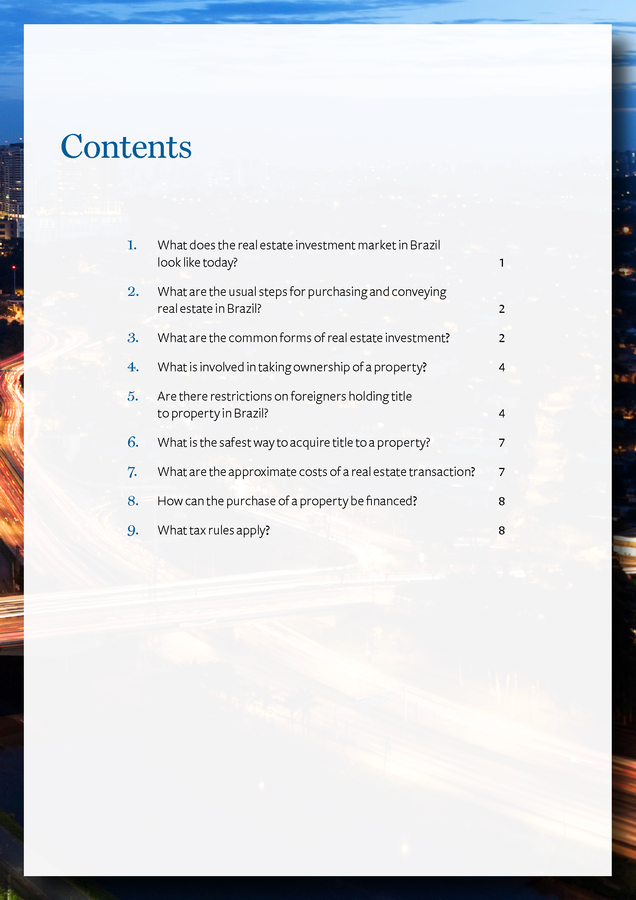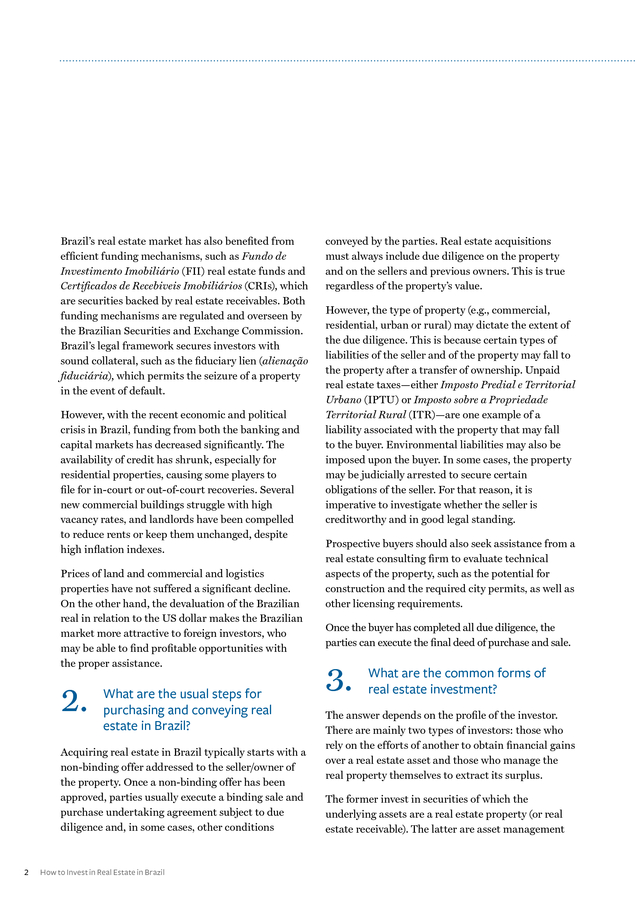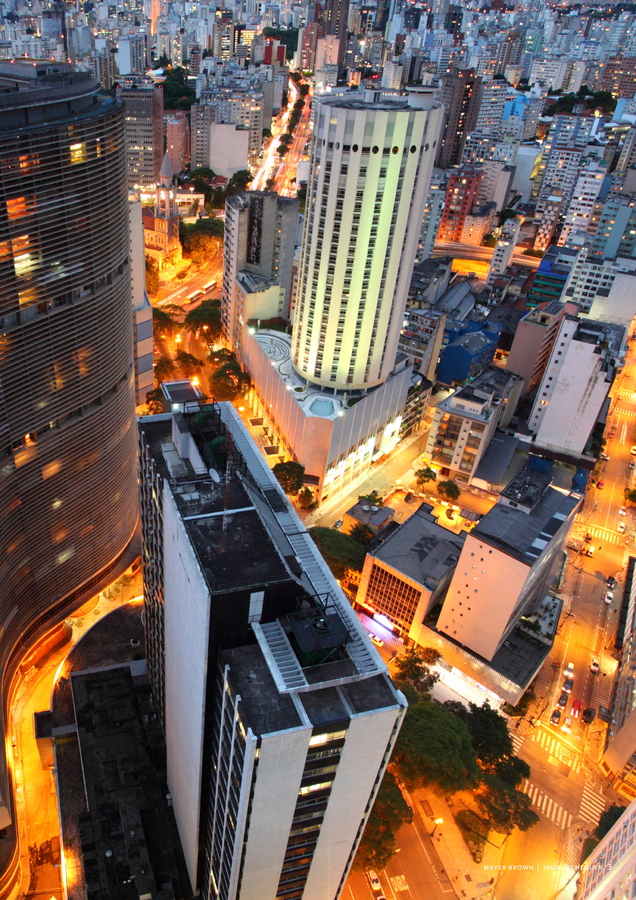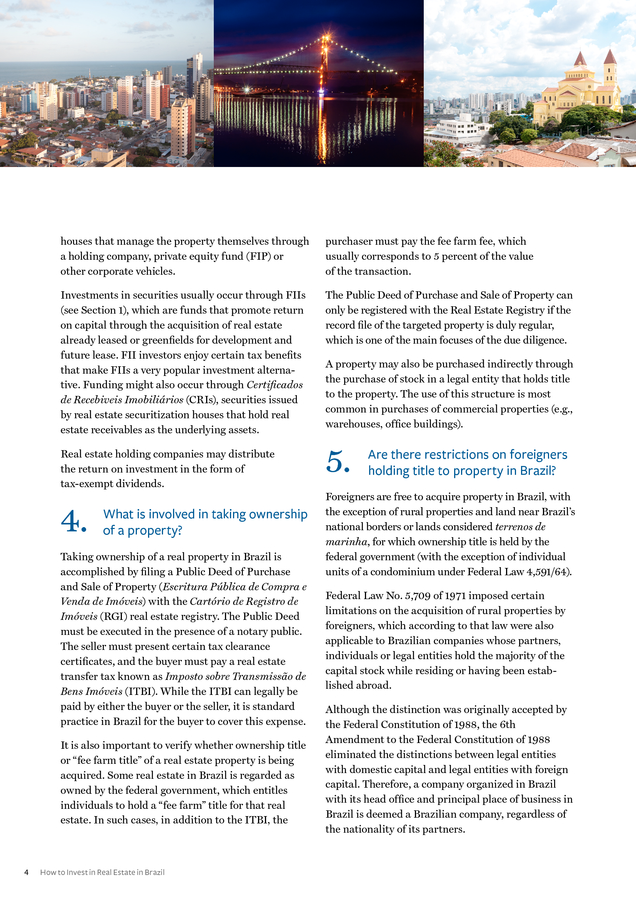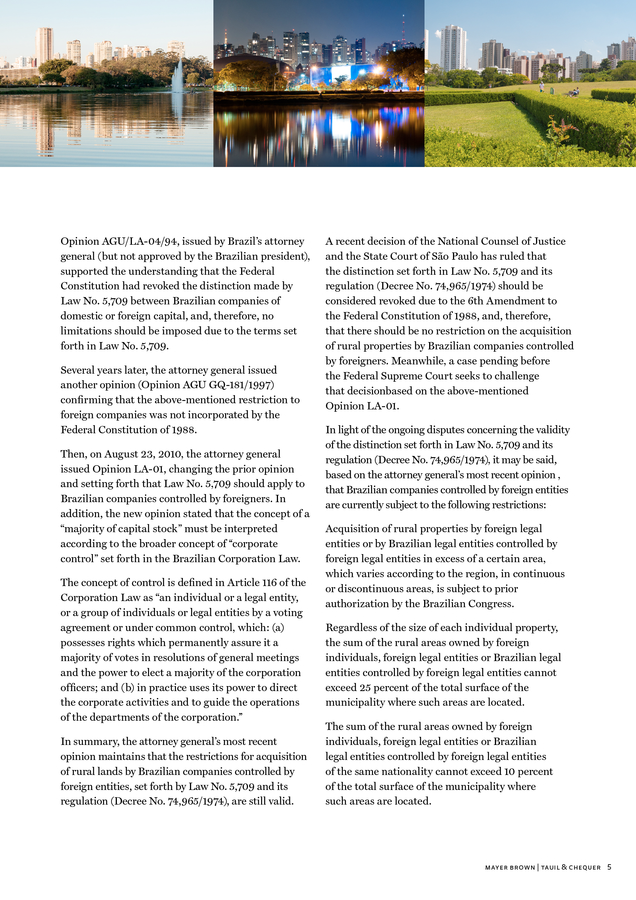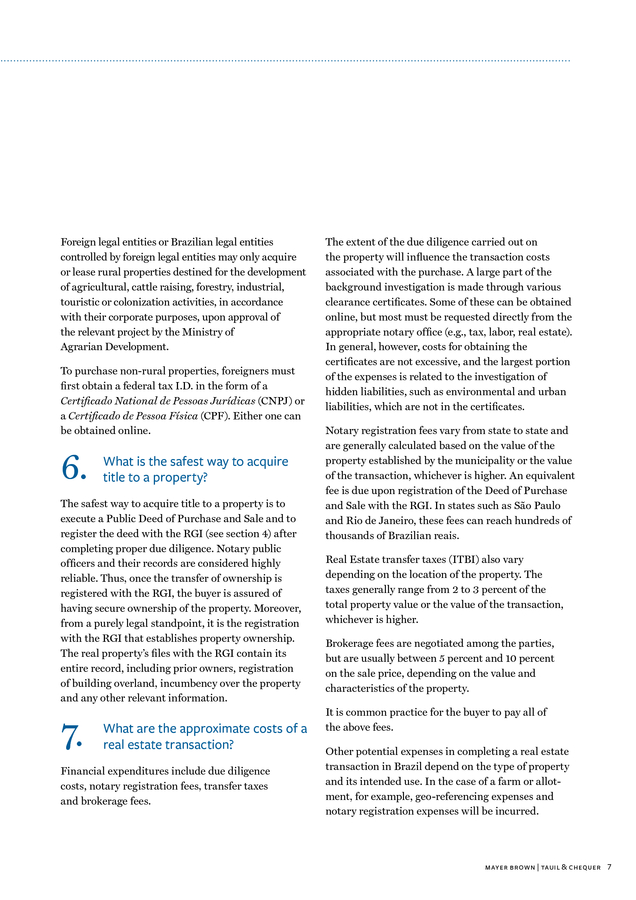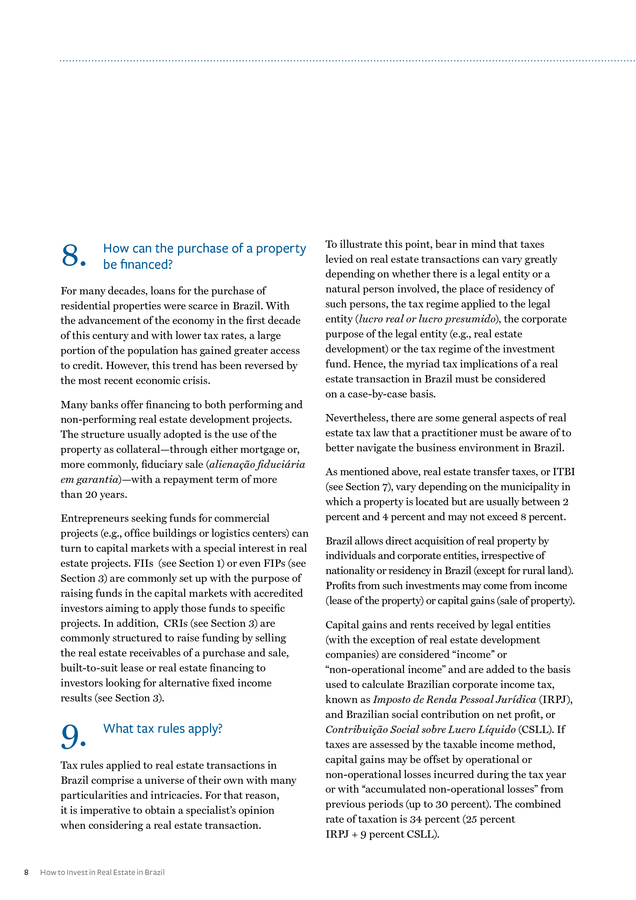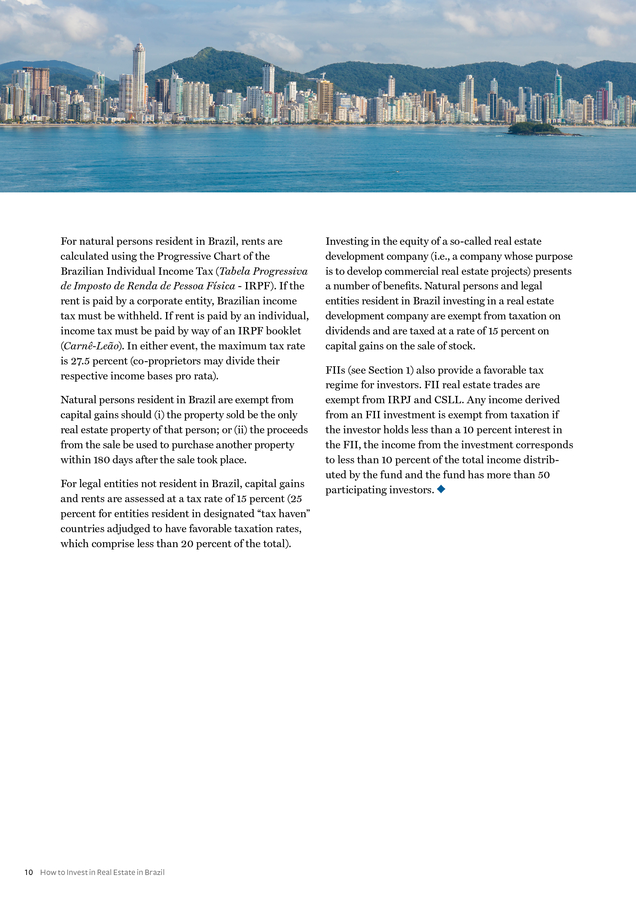Description
How to Invest in Real Estate
in Brazil
.
. Contents
1.
What does the real estate investment market in Brazil
look like today?
1
What are the usual steps for purchasing and conveying
real estate in Brazil?
2
3.
What are the common forms of real estate investment?
2
4.
What is involved in taking ownership of a property?
4
5.
Are there restrictions on foreigners holding title
to property in Brazil?
4
6.
What is the safest way to acquire title to a property?
7
7.
What are the approximate costs of a real estate transaction?
7
8.
How can the purchase of a property be financed?
8
9.
What tax rules apply?
8
2.
mayer brown | tauil & chequer i
.
. HOW TO INVEST IN REAL ESTATE IN BRAZIL
Brazil’s economic growth during the past decade significantly boosted
the country’s real estate market. Tauil & Chequer in association with
Mayer Brown has years of in-depth real estate experience in areas such
as real estate finance, structured transactions and real estate tax.
Our full-service law firm offers clients comprehensive
legal counsel in the handling of real estate
transactions in Brazil, including investments
by foreign-based entities and individuals.
Following are answers to some of the questions we
consider most important when contemplating a real
estate transaction in Brazil.
1.
What does the real estate investment
market in Brazil look like today?
The Brazilian economic boom that began in the
mid-2000s greatly eased access to credit and sharply
increased consumer buying power in the country.
These factors, combined with a reliable legal
framework that offers simple, straightforward
rules for real estate funding (as well as sophisticated
financial products that use real estate properties
as underlying assets) have produced a vibrant
real estate market.
Today, commercial, residential and rural land real
estate transactions are all popular investment
options in Brazil. The market has attracted
many investors seeking tailored transactions
(e.g., built-to-suit lease and sale and lease-back
on offices, logistic centers, warehouses and industrial
facilities) on behalf of large multinational clients.
Other investors have turned to Brazil seeking new
real estate frontiers (e.g., investments in farms or
suburban residential areas) in a country that
covers a vast territory.
Hence, during the past decade, Brazil saw the
formation and consolidation of a market with
a unique profile.
Longstanding challenges, such as underdeveloped
mass transportation infrastructure in Brazil’s largest
metropolitan areas, have made the exploitation of
suburban areas more challenging.
Notwithstanding these weaknesses, real estate in the
core urban areas has not declined in value. On the
contrary, the challenges confronting Brazil’s cities
have brought about a wave of renovations of old
commercial facilities and the retrofitting of many
residential buildings.
Moreover, new commercial areas in the inner parts of Brazil’s largest cities, such as Av. Faria Lima in São Paulo and Porto Maravilha in Rio de Janeiro, have attracted investments for the construction of AAA commercial buildings. mayer brown | tauil & chequer 1 . Brazil’s real estate market has also benefited from efficient funding mechanisms, such as Fundo de Investimento Imobiliário (FII) real estate funds and Certificados de Recebiveis Imobiliários (CRIs), which are securities backed by real estate receivables. Both funding mechanisms are regulated and overseen by the Brazilian Securities and Exchange Commission. Brazil’s legal framework secures investors with sound collateral, such as the fiduciary lien (alienação fiduciária), which permits the seizure of a property in the event of default. However, with the recent economic and political crisis in Brazil, funding from both the banking and capital markets has decreased significantly. The availability of credit has shrunk, especially for residential properties, causing some players to file for in-court or out-of-court recoveries. Several new commercial buildings struggle with high vacancy rates, and landlords have been compelled to reduce rents or keep them unchanged, despite high inflation indexes. Prices of land and commercial and logistics properties have not suffered a significant decline. On the other hand, the devaluation of the Brazilian real in relation to the US dollar makes the Brazilian market more attractive to foreign investors, who may be able to find profitable opportunities with the proper assistance. 2. What are the usual steps for purchasing and conveying real estate in Brazil? Acquiring real estate in Brazil typically starts with a non-binding offer addressed to the seller/owner of the property.
Once a non-binding offer has been approved, parties usually execute a binding sale and purchase undertaking agreement subject to due diligence and, in some cases, other conditions 2 How to Invest in Real Estate in Brazil conveyed by the parties. Real estate acquisitions must always include due diligence on the property and on the sellers and previous owners. This is true regardless of the property’s value. However, the type of property (e.g., commercial, residential, urban or rural) may dictate the extent of the due diligence.
This is because certain types of liabilities of the seller and of the property may fall to the property after a transfer of ownership. Unpaid real estate taxes—either Imposto Predial e Territorial Urbano (IPTU) or Imposto sobre a Propriedade Territorial Rural (ITR)—are one example of a liability associated with the property that may fall to the buyer. Environmental liabilities may also be imposed upon the buyer.
In some cases, the property may be judicially arrested to secure certain obligations of the seller. For that reason, it is imperative to investigate whether the seller is creditworthy and in good legal standing. Prospective buyers should also seek assistance from a real estate consulting firm to evaluate technical aspects of the property, such as the potential for construction and the required city permits, as well as other licensing requirements. Once the buyer has completed all due diligence, the parties can execute the final deed of purchase and sale. 3. What are the common forms of real estate investment? The answer depends on the profile of the investor. There are mainly two types of investors: those who rely on the efforts of another to obtain financial gains over a real estate asset and those who manage the real property themselves to extract its surplus. The former invest in securities of which the underlying assets are a real estate property (or real estate receivable). The latter are asset management .
mayer brown | tauil & chequer 3 mayer brown tauil & chequer . houses that manage the property themselves through a holding company, private equity fund (FIP) or other corporate vehicles. purchaser must pay the fee farm fee, which usually corresponds to 5 percent of the value of the transaction. Investments in securities usually occur through FIIs (see Section 1), which are funds that promote return on capital through the acquisition of real estate already leased or greenfields for development and future lease. FII investors enjoy certain tax benefits that make FIIs a very popular investment alternative. Funding might also occur through Certificados de Recebiveis Imobiliários (CRIs), securities issued by real estate securitization houses that hold real estate receivables as the underlying assets. The Public Deed of Purchase and Sale of Property can only be registered with the Real Estate Registry if the record file of the targeted property is duly regular, which is one of the main focuses of the due diligence. Real estate holding companies may distribute the return on investment in the form of tax-exempt dividends. 4. What is involved in taking ownership of a property? Taking ownership of a real property in Brazil is accomplished by filing a Public Deed of Purchase and Sale of Property (Escritura Pública de Compra e Venda de Imóveis) with the Cartório de Registro de Imóveis (RGI) real estate registry. The Public Deed must be executed in the presence of a notary public. The seller must present certain tax clearance certificates, and the buyer must pay a real estate transfer tax known as Imposto sobre Transmissão de Bens Imóveis (ITBI).
While the ITBI can legally be paid by either the buyer or the seller, it is standard practice in Brazil for the buyer to cover this expense. It is also important to verify whether ownership title or “fee farm title” of a real estate property is being acquired. Some real estate in Brazil is regarded as owned by the federal government, which entitles individuals to hold a “fee farm” title for that real estate. In such cases, in addition to the ITBI, the 4 How to Invest in Real Estate in Brazil A property may also be purchased indirectly through the purchase of stock in a legal entity that holds title to the property.
The use of this structure is most common in purchases of commercial properties (e.g., warehouses, office buildings). 5. Are there restrictions on foreigners holding title to property in Brazil? Foreigners are free to acquire property in Brazil, with the exception of rural properties and land near Brazil’s national borders or lands considered terrenos de marinha, for which ownership title is held by the federal government (with the exception of individual units of a condominium under Federal Law 4,591/64). Federal Law No. 5,709 of 1971 imposed certain limitations on the acquisition of rural properties by foreigners, which according to that law were also applicable to Brazilian companies whose partners, individuals or legal entities hold the majority of the capital stock while residing or having been established abroad. Although the distinction was originally accepted by the Federal Constitution of 1988, the 6th Amendment to the Federal Constitution of 1988 eliminated the distinctions between legal entities with domestic capital and legal entities with foreign capital. Therefore, a company organized in Brazil with its head office and principal place of business in Brazil is deemed a Brazilian company, regardless of the nationality of its partners. .
Opinion AGU/LA-04/94, issued by Brazil’s attorney general (but not approved by the Brazilian president), supported the understanding that the Federal Constitution had revoked the distinction made by Law No. 5,709 between Brazilian companies of domestic or foreign capital, and, therefore, no limitations should be imposed due to the terms set forth in Law No. 5,709. Several years later, the attorney general issued another opinion (Opinion AGU GQ-181/1997) confirming that the above-mentioned restriction to foreign companies was not incorporated by the Federal Constitution of 1988. Then, on August 23, 2010, the attorney general issued Opinion LA-01, changing the prior opinion and setting forth that Law No. 5,709 should apply to Brazilian companies controlled by foreigners.
In addition, the new opinion stated that the concept of a “majority of capital stock” must be interpreted according to the broader concept of “corporate control” set forth in the Brazilian Corporation Law. The concept of control is defined in Article 116 of the Corporation Law as “an individual or a legal entity, or a group of individuals or legal entities by a voting agreement or under common control, which: (a) possesses rights which permanently assure it a majority of votes in resolutions of general meetings and the power to elect a majority of the corporation officers; and (b) in practice uses its power to direct the corporate activities and to guide the operations of the departments of the corporation.” In summary, the attorney general’s most recent opinion maintains that the restrictions for acquisition of rural lands by Brazilian companies controlled by foreign entities, set forth by Law No. 5,709 and its regulation (Decree No. 74,965/1974), are still valid. A recent decision of the National Counsel of Justice and the State Court of São Paulo has ruled that the distinction set forth in Law No.
5,709 and its regulation (Decree No. 74,965/1974) should be considered revoked due to the 6th Amendment to the Federal Constitution of 1988, and, therefore, that there should be no restriction on the acquisition of rural properties by Brazilian companies controlled by foreigners. Meanwhile, a case pending before the Federal Supreme Court seeks to challenge that decisionbased on the above-mentioned Opinion LA-01. In light of the ongoing disputes concerning the validity of the distinction set forth in Law No.
5,709 and its regulation (Decree No. 74,965/1974), it may be said, based on the attorney general’s most recent opinion , that Brazilian companies controlled by foreign entities are currently subject to the following restrictions: Acquisition of rural properties by foreign legal entities or by Brazilian legal entities controlled by foreign legal entities in excess of a certain area, which varies according to the region, in continuous or discontinuous areas, is subject to prior authorization by the Brazilian Congress. Regardless of the size of each individual property, the sum of the rural areas owned by foreign individuals, foreign legal entities or Brazilian legal entities controlled by foreign legal entities cannot exceed 25 percent of the total surface of the municipality where such areas are located. The sum of the rural areas owned by foreign individuals, foreign legal entities or Brazilian legal entities controlled by foreign legal entities of the same nationality cannot exceed 10 percent of the total surface of the municipality where such areas are located. mayer brown | tauil & chequer 5 . 6 How to Invest in Real Estate in Brazil . Foreign legal entities or Brazilian legal entities controlled by foreign legal entities may only acquire or lease rural properties destined for the development of agricultural, cattle raising, forestry, industrial, touristic or colonization activities, in accordance with their corporate purposes, upon approval of the relevant project by the Ministry of Agrarian Development. To purchase non-rural properties, foreigners must first obtain a federal tax I.D. in the form of a Certificado National de Pessoas Jurídicas (CNPJ) or a Certificado de Pessoa Física (CPF). Either one can be obtained online. 6. What is the safest way to acquire title to a property? The safest way to acquire title to a property is to execute a Public Deed of Purchase and Sale and to register the deed with the RGI (see section 4) after completing proper due diligence. Notary public officers and their records are considered highly reliable.
Thus, once the transfer of ownership is registered with the RGI, the buyer is assured of having secure ownership of the property. Moreover, from a purely legal standpoint, it is the registration with the RGI that establishes property ownership. The real property’s files with the RGI contain its entire record, including prior owners, registration of building overland, incumbency over the property and any other relevant information. 7. What are the approximate costs of a real estate transaction? Financial expenditures include due diligence costs, notary registration fees, transfer taxes and brokerage fees. The extent of the due diligence carried out on the property will influence the transaction costs associated with the purchase. A large part of the background investigation is made through various clearance certificates.
Some of these can be obtained online, but most must be requested directly from the appropriate notary office (e.g., tax, labor, real estate). In general, however, costs for obtaining the certificates are not excessive, and the largest portion of the expenses is related to the investigation of hidden liabilities, such as environmental and urban liabilities, which are not in the certificates. Notary registration fees vary from state to state and are generally calculated based on the value of the property established by the municipality or the value of the transaction, whichever is higher. An equivalent fee is due upon registration of the Deed of Purchase and Sale with the RGI. In states such as São Paulo and Rio de Janeiro, these fees can reach hundreds of thousands of Brazilian reais. Real Estate transfer taxes (ITBI) also vary depending on the location of the property.
The taxes generally range from 2 to 3 percent of the total property value or the value of the transaction, whichever is higher. Brokerage fees are negotiated among the parties, but are usually between 5 percent and 10 percent on the sale price, depending on the value and characteristics of the property. It is common practice for the buyer to pay all of the above fees. Other potential expenses in completing a real estate transaction in Brazil depend on the type of property and its intended use. In the case of a farm or allotment, for example, geo-referencing expenses and notary registration expenses will be incurred. mayer brown | tauil & chequer 7 . 8. How can the purchase of a property be financed? For many decades, loans for the purchase of residential properties were scarce in Brazil. With the advancement of the economy in the first decade of this century and with lower tax rates, a large portion of the population has gained greater access to credit. However, this trend has been reversed by the most recent economic crisis. Many banks offer financing to both performing and non-performing real estate development projects. The structure usually adopted is the use of the property as collateral—through either mortgage or, more commonly, fiduciary sale (alienação fiduciária em garantia)—with a repayment term of more than 20 years. Entrepreneurs seeking funds for commercial projects (e.g., office buildings or logistics centers) can turn to capital markets with a special interest in real estate projects. FIIs (see Section 1) or even FIPs (see Section 3) are commonly set up with the purpose of raising funds in the capital markets with accredited investors aiming to apply those funds to specific projects.
In addition, CRIs (see Section 3) are commonly structured to raise funding by selling the real estate receivables of a purchase and sale, built-to-suit lease or real estate financing to investors looking for alternative fixed income results (see Section 3). 9. What tax rules apply? Tax rules applied to real estate transactions in Brazil comprise a universe of their own with many particularities and intricacies. For that reason, it is imperative to obtain a specialist’s opinion when considering a real estate transaction. 8 How to Invest in Real Estate in Brazil To illustrate this point, bear in mind that taxes levied on real estate transactions can vary greatly depending on whether there is a legal entity or a natural person involved, the place of residency of such persons, the tax regime applied to the legal entity (lucro real or lucro presumido), the corporate purpose of the legal entity (e.g., real estate development) or the tax regime of the investment fund. Hence, the myriad tax implications of a real estate transaction in Brazil must be considered on a case-by-case basis. Nevertheless, there are some general aspects of real estate tax law that a practitioner must be aware of to better navigate the business environment in Brazil. As mentioned above, real estate transfer taxes, or ITBI (see Section 7), vary depending on the municipality in which a property is located but are usually between 2 percent and 4 percent and may not exceed 8 percent. Brazil allows direct acquisition of real property by individuals and corporate entities, irrespective of nationality or residency in Brazil (except for rural land). Profits from such investments may come from income (lease of the property) or capital gains (sale of property). Capital gains and rents received by legal entities (with the exception of real estate development companies) are considered “income” or “non-operational income” and are added to the basis used to calculate Brazilian corporate income tax, known as Imposto de Renda Pessoal Jurídica (IRPJ), and Brazilian social contribution on net profit, or Contribuição Social sobre Lucro Líquido (CSLL).
If taxes are assessed by the taxable income method, capital gains may be offset by operational or non-operational losses incurred during the tax year or with “accumulated non-operational losses” from previous periods (up to 30 percent). The combined rate of taxation is 34 percent (25 percent IRPJ + 9 percent CSLL). . mayer brown | tauil & chequer 9 . For natural persons resident in Brazil, rents are calculated using the Progressive Chart of the Brazilian Individual Income Tax (Tabela Progressiva de Imposto de Renda de Pessoa Física - IRPF). If the rent is paid by a corporate entity, Brazilian income tax must be withheld. If rent is paid by an individual, income tax must be paid by way of an IRPF booklet (Carnê-Leão). In either event, the maximum tax rate is 27.5 percent (co-proprietors may divide their respective income bases pro rata). Natural persons resident in Brazil are exempt from capital gains should (i) the property sold be the only real estate property of that person; or (ii) the proceeds from the sale be used to purchase another property within 180 days after the sale took place. For legal entities not resident in Brazil, capital gains and rents are assessed at a tax rate of 15 percent (25 percent for entities resident in designated “tax haven” countries adjudged to have favorable taxation rates, which comprise less than 20 percent of the total). 10 How to Invest in Real Estate in Brazil Investing in the equity of a so-called real estate development company (i.e., a company whose purpose is to develop commercial real estate projects) presents a number of benefits.
Natural persons and legal entities resident in Brazil investing in a real estate development company are exempt from taxation on dividends and are taxed at a rate of 15 percent on capital gains on the sale of stock. FIIs (see Section 1) also provide a favorable tax regime for investors. FII real estate trades are exempt from IRPJ and CSLL. Any income derived from an FII investment is exempt from taxation if the investor holds less than a 10 percent interest in the FII, the income from the investment corresponds to less than 10 percent of the total income distributed by the fund and the fund has more than 50 participating investors. .
About Tauil & Chequer Advogados Tauil & Chequer Advogados in association with Mayer Brown has a team of partners and associates that are highly experienced in several areas of business law in Brazil, representing clients in a range of matters, from simple everyday transactions to extremely complex and sophisticated deals, with a unique level of excellence in the legal market. We are a full-service firm offering legal advice to national and international clients, financial institutions and government entities. Our clients value our ability to offer creative, pragmatic and sophisticated solutions and deal with specific demands using our international work platform with Mayer Brown. We also have solid experience and presence in Africa, mainly in Angola and Mozambique. Please visit www.tauilchequer.com.br/en-us for comprehensive contact information for Tauil & Chequer offices. © 2016 Tauil & Chequer Advogados. All rights reserved. About Mayer Brown Mayer Brown is a global legal services provider advising clients across the Americas, Asia and Europe. Our geographic strength means we can offer local market knowledge combined with global reach. We are noted for our commitment to client service and our ability to assist clients with their most complex and demanding legal and business challenges worldwide.
We serve many of the world’s largest companies, including a significant proportion of the Fortune 100, FTSE 100, DAX and Hang Seng Index companies and more than half of the world’s largest banks. We provide legal services in areas such as banking and finance; corporate and securities; litigation and dispute resolution; antitrust and competition; US Supreme Court and appellate matters; employment and benefits; environmental; financial services regulatory and enforcement; government and global trade; intellectual property; real estate; tax; restructuring, bankruptcy and insolvency; and wealth management. Please visit www.mayerbrown.com for comprehensive contact information for all Mayer Brown offices. Mayer Brown comprises legal practices that are separate entities (the “Mayer Brown Practices”). The Mayer Brown Practices are: Mayer Brown LLP and Mayer Brown EuropeBrussels LLP, both limited liability partnerships established in Illinois USA; Mayer Brown International LLP, a limited liability partnership incorporated in England and Wales (authorized and regulated by the Solicitors Regulation Authority and registered in England and Wales number OC 303359); Mayer Brown, a SELAS established in France; Mayer Brown Mexico, S.C., a sociedad civil formed under the laws of the State of Durango, Mexico; Mayer Brown JSM, a Hong Kong partnership and its associated legal practices in Asia; and Tauil & Chequer Advogados, a Brazilian law partnership with which Mayer Brown is associated.
Mayer Brown Consulting (Singapore) Pte. Ltd and its subsidiary, which are affiliated with Mayer Brown, provide customs and trade advisory and consultancy services, not legal services. “Mayer Brown” and the Mayer Brown logo are the trademarks of the Mayer Brown Practices in their respective jurisdictions. © 2016 The Mayer Brown Practices. All rights reserved. .
Americas | Asia | Europe | www.mayerbrown.com 0116 .
Moreover, new commercial areas in the inner parts of Brazil’s largest cities, such as Av. Faria Lima in São Paulo and Porto Maravilha in Rio de Janeiro, have attracted investments for the construction of AAA commercial buildings. mayer brown | tauil & chequer 1 . Brazil’s real estate market has also benefited from efficient funding mechanisms, such as Fundo de Investimento Imobiliário (FII) real estate funds and Certificados de Recebiveis Imobiliários (CRIs), which are securities backed by real estate receivables. Both funding mechanisms are regulated and overseen by the Brazilian Securities and Exchange Commission. Brazil’s legal framework secures investors with sound collateral, such as the fiduciary lien (alienação fiduciária), which permits the seizure of a property in the event of default. However, with the recent economic and political crisis in Brazil, funding from both the banking and capital markets has decreased significantly. The availability of credit has shrunk, especially for residential properties, causing some players to file for in-court or out-of-court recoveries. Several new commercial buildings struggle with high vacancy rates, and landlords have been compelled to reduce rents or keep them unchanged, despite high inflation indexes. Prices of land and commercial and logistics properties have not suffered a significant decline. On the other hand, the devaluation of the Brazilian real in relation to the US dollar makes the Brazilian market more attractive to foreign investors, who may be able to find profitable opportunities with the proper assistance. 2. What are the usual steps for purchasing and conveying real estate in Brazil? Acquiring real estate in Brazil typically starts with a non-binding offer addressed to the seller/owner of the property.
Once a non-binding offer has been approved, parties usually execute a binding sale and purchase undertaking agreement subject to due diligence and, in some cases, other conditions 2 How to Invest in Real Estate in Brazil conveyed by the parties. Real estate acquisitions must always include due diligence on the property and on the sellers and previous owners. This is true regardless of the property’s value. However, the type of property (e.g., commercial, residential, urban or rural) may dictate the extent of the due diligence.
This is because certain types of liabilities of the seller and of the property may fall to the property after a transfer of ownership. Unpaid real estate taxes—either Imposto Predial e Territorial Urbano (IPTU) or Imposto sobre a Propriedade Territorial Rural (ITR)—are one example of a liability associated with the property that may fall to the buyer. Environmental liabilities may also be imposed upon the buyer.
In some cases, the property may be judicially arrested to secure certain obligations of the seller. For that reason, it is imperative to investigate whether the seller is creditworthy and in good legal standing. Prospective buyers should also seek assistance from a real estate consulting firm to evaluate technical aspects of the property, such as the potential for construction and the required city permits, as well as other licensing requirements. Once the buyer has completed all due diligence, the parties can execute the final deed of purchase and sale. 3. What are the common forms of real estate investment? The answer depends on the profile of the investor. There are mainly two types of investors: those who rely on the efforts of another to obtain financial gains over a real estate asset and those who manage the real property themselves to extract its surplus. The former invest in securities of which the underlying assets are a real estate property (or real estate receivable). The latter are asset management .
mayer brown | tauil & chequer 3 mayer brown tauil & chequer . houses that manage the property themselves through a holding company, private equity fund (FIP) or other corporate vehicles. purchaser must pay the fee farm fee, which usually corresponds to 5 percent of the value of the transaction. Investments in securities usually occur through FIIs (see Section 1), which are funds that promote return on capital through the acquisition of real estate already leased or greenfields for development and future lease. FII investors enjoy certain tax benefits that make FIIs a very popular investment alternative. Funding might also occur through Certificados de Recebiveis Imobiliários (CRIs), securities issued by real estate securitization houses that hold real estate receivables as the underlying assets. The Public Deed of Purchase and Sale of Property can only be registered with the Real Estate Registry if the record file of the targeted property is duly regular, which is one of the main focuses of the due diligence. Real estate holding companies may distribute the return on investment in the form of tax-exempt dividends. 4. What is involved in taking ownership of a property? Taking ownership of a real property in Brazil is accomplished by filing a Public Deed of Purchase and Sale of Property (Escritura Pública de Compra e Venda de Imóveis) with the Cartório de Registro de Imóveis (RGI) real estate registry. The Public Deed must be executed in the presence of a notary public. The seller must present certain tax clearance certificates, and the buyer must pay a real estate transfer tax known as Imposto sobre Transmissão de Bens Imóveis (ITBI).
While the ITBI can legally be paid by either the buyer or the seller, it is standard practice in Brazil for the buyer to cover this expense. It is also important to verify whether ownership title or “fee farm title” of a real estate property is being acquired. Some real estate in Brazil is regarded as owned by the federal government, which entitles individuals to hold a “fee farm” title for that real estate. In such cases, in addition to the ITBI, the 4 How to Invest in Real Estate in Brazil A property may also be purchased indirectly through the purchase of stock in a legal entity that holds title to the property.
The use of this structure is most common in purchases of commercial properties (e.g., warehouses, office buildings). 5. Are there restrictions on foreigners holding title to property in Brazil? Foreigners are free to acquire property in Brazil, with the exception of rural properties and land near Brazil’s national borders or lands considered terrenos de marinha, for which ownership title is held by the federal government (with the exception of individual units of a condominium under Federal Law 4,591/64). Federal Law No. 5,709 of 1971 imposed certain limitations on the acquisition of rural properties by foreigners, which according to that law were also applicable to Brazilian companies whose partners, individuals or legal entities hold the majority of the capital stock while residing or having been established abroad. Although the distinction was originally accepted by the Federal Constitution of 1988, the 6th Amendment to the Federal Constitution of 1988 eliminated the distinctions between legal entities with domestic capital and legal entities with foreign capital. Therefore, a company organized in Brazil with its head office and principal place of business in Brazil is deemed a Brazilian company, regardless of the nationality of its partners. .
Opinion AGU/LA-04/94, issued by Brazil’s attorney general (but not approved by the Brazilian president), supported the understanding that the Federal Constitution had revoked the distinction made by Law No. 5,709 between Brazilian companies of domestic or foreign capital, and, therefore, no limitations should be imposed due to the terms set forth in Law No. 5,709. Several years later, the attorney general issued another opinion (Opinion AGU GQ-181/1997) confirming that the above-mentioned restriction to foreign companies was not incorporated by the Federal Constitution of 1988. Then, on August 23, 2010, the attorney general issued Opinion LA-01, changing the prior opinion and setting forth that Law No. 5,709 should apply to Brazilian companies controlled by foreigners.
In addition, the new opinion stated that the concept of a “majority of capital stock” must be interpreted according to the broader concept of “corporate control” set forth in the Brazilian Corporation Law. The concept of control is defined in Article 116 of the Corporation Law as “an individual or a legal entity, or a group of individuals or legal entities by a voting agreement or under common control, which: (a) possesses rights which permanently assure it a majority of votes in resolutions of general meetings and the power to elect a majority of the corporation officers; and (b) in practice uses its power to direct the corporate activities and to guide the operations of the departments of the corporation.” In summary, the attorney general’s most recent opinion maintains that the restrictions for acquisition of rural lands by Brazilian companies controlled by foreign entities, set forth by Law No. 5,709 and its regulation (Decree No. 74,965/1974), are still valid. A recent decision of the National Counsel of Justice and the State Court of São Paulo has ruled that the distinction set forth in Law No.
5,709 and its regulation (Decree No. 74,965/1974) should be considered revoked due to the 6th Amendment to the Federal Constitution of 1988, and, therefore, that there should be no restriction on the acquisition of rural properties by Brazilian companies controlled by foreigners. Meanwhile, a case pending before the Federal Supreme Court seeks to challenge that decisionbased on the above-mentioned Opinion LA-01. In light of the ongoing disputes concerning the validity of the distinction set forth in Law No.
5,709 and its regulation (Decree No. 74,965/1974), it may be said, based on the attorney general’s most recent opinion , that Brazilian companies controlled by foreign entities are currently subject to the following restrictions: Acquisition of rural properties by foreign legal entities or by Brazilian legal entities controlled by foreign legal entities in excess of a certain area, which varies according to the region, in continuous or discontinuous areas, is subject to prior authorization by the Brazilian Congress. Regardless of the size of each individual property, the sum of the rural areas owned by foreign individuals, foreign legal entities or Brazilian legal entities controlled by foreign legal entities cannot exceed 25 percent of the total surface of the municipality where such areas are located. The sum of the rural areas owned by foreign individuals, foreign legal entities or Brazilian legal entities controlled by foreign legal entities of the same nationality cannot exceed 10 percent of the total surface of the municipality where such areas are located. mayer brown | tauil & chequer 5 . 6 How to Invest in Real Estate in Brazil . Foreign legal entities or Brazilian legal entities controlled by foreign legal entities may only acquire or lease rural properties destined for the development of agricultural, cattle raising, forestry, industrial, touristic or colonization activities, in accordance with their corporate purposes, upon approval of the relevant project by the Ministry of Agrarian Development. To purchase non-rural properties, foreigners must first obtain a federal tax I.D. in the form of a Certificado National de Pessoas Jurídicas (CNPJ) or a Certificado de Pessoa Física (CPF). Either one can be obtained online. 6. What is the safest way to acquire title to a property? The safest way to acquire title to a property is to execute a Public Deed of Purchase and Sale and to register the deed with the RGI (see section 4) after completing proper due diligence. Notary public officers and their records are considered highly reliable.
Thus, once the transfer of ownership is registered with the RGI, the buyer is assured of having secure ownership of the property. Moreover, from a purely legal standpoint, it is the registration with the RGI that establishes property ownership. The real property’s files with the RGI contain its entire record, including prior owners, registration of building overland, incumbency over the property and any other relevant information. 7. What are the approximate costs of a real estate transaction? Financial expenditures include due diligence costs, notary registration fees, transfer taxes and brokerage fees. The extent of the due diligence carried out on the property will influence the transaction costs associated with the purchase. A large part of the background investigation is made through various clearance certificates.
Some of these can be obtained online, but most must be requested directly from the appropriate notary office (e.g., tax, labor, real estate). In general, however, costs for obtaining the certificates are not excessive, and the largest portion of the expenses is related to the investigation of hidden liabilities, such as environmental and urban liabilities, which are not in the certificates. Notary registration fees vary from state to state and are generally calculated based on the value of the property established by the municipality or the value of the transaction, whichever is higher. An equivalent fee is due upon registration of the Deed of Purchase and Sale with the RGI. In states such as São Paulo and Rio de Janeiro, these fees can reach hundreds of thousands of Brazilian reais. Real Estate transfer taxes (ITBI) also vary depending on the location of the property.
The taxes generally range from 2 to 3 percent of the total property value or the value of the transaction, whichever is higher. Brokerage fees are negotiated among the parties, but are usually between 5 percent and 10 percent on the sale price, depending on the value and characteristics of the property. It is common practice for the buyer to pay all of the above fees. Other potential expenses in completing a real estate transaction in Brazil depend on the type of property and its intended use. In the case of a farm or allotment, for example, geo-referencing expenses and notary registration expenses will be incurred. mayer brown | tauil & chequer 7 . 8. How can the purchase of a property be financed? For many decades, loans for the purchase of residential properties were scarce in Brazil. With the advancement of the economy in the first decade of this century and with lower tax rates, a large portion of the population has gained greater access to credit. However, this trend has been reversed by the most recent economic crisis. Many banks offer financing to both performing and non-performing real estate development projects. The structure usually adopted is the use of the property as collateral—through either mortgage or, more commonly, fiduciary sale (alienação fiduciária em garantia)—with a repayment term of more than 20 years. Entrepreneurs seeking funds for commercial projects (e.g., office buildings or logistics centers) can turn to capital markets with a special interest in real estate projects. FIIs (see Section 1) or even FIPs (see Section 3) are commonly set up with the purpose of raising funds in the capital markets with accredited investors aiming to apply those funds to specific projects.
In addition, CRIs (see Section 3) are commonly structured to raise funding by selling the real estate receivables of a purchase and sale, built-to-suit lease or real estate financing to investors looking for alternative fixed income results (see Section 3). 9. What tax rules apply? Tax rules applied to real estate transactions in Brazil comprise a universe of their own with many particularities and intricacies. For that reason, it is imperative to obtain a specialist’s opinion when considering a real estate transaction. 8 How to Invest in Real Estate in Brazil To illustrate this point, bear in mind that taxes levied on real estate transactions can vary greatly depending on whether there is a legal entity or a natural person involved, the place of residency of such persons, the tax regime applied to the legal entity (lucro real or lucro presumido), the corporate purpose of the legal entity (e.g., real estate development) or the tax regime of the investment fund. Hence, the myriad tax implications of a real estate transaction in Brazil must be considered on a case-by-case basis. Nevertheless, there are some general aspects of real estate tax law that a practitioner must be aware of to better navigate the business environment in Brazil. As mentioned above, real estate transfer taxes, or ITBI (see Section 7), vary depending on the municipality in which a property is located but are usually between 2 percent and 4 percent and may not exceed 8 percent. Brazil allows direct acquisition of real property by individuals and corporate entities, irrespective of nationality or residency in Brazil (except for rural land). Profits from such investments may come from income (lease of the property) or capital gains (sale of property). Capital gains and rents received by legal entities (with the exception of real estate development companies) are considered “income” or “non-operational income” and are added to the basis used to calculate Brazilian corporate income tax, known as Imposto de Renda Pessoal Jurídica (IRPJ), and Brazilian social contribution on net profit, or Contribuição Social sobre Lucro Líquido (CSLL).
If taxes are assessed by the taxable income method, capital gains may be offset by operational or non-operational losses incurred during the tax year or with “accumulated non-operational losses” from previous periods (up to 30 percent). The combined rate of taxation is 34 percent (25 percent IRPJ + 9 percent CSLL). . mayer brown | tauil & chequer 9 . For natural persons resident in Brazil, rents are calculated using the Progressive Chart of the Brazilian Individual Income Tax (Tabela Progressiva de Imposto de Renda de Pessoa Física - IRPF). If the rent is paid by a corporate entity, Brazilian income tax must be withheld. If rent is paid by an individual, income tax must be paid by way of an IRPF booklet (Carnê-Leão). In either event, the maximum tax rate is 27.5 percent (co-proprietors may divide their respective income bases pro rata). Natural persons resident in Brazil are exempt from capital gains should (i) the property sold be the only real estate property of that person; or (ii) the proceeds from the sale be used to purchase another property within 180 days after the sale took place. For legal entities not resident in Brazil, capital gains and rents are assessed at a tax rate of 15 percent (25 percent for entities resident in designated “tax haven” countries adjudged to have favorable taxation rates, which comprise less than 20 percent of the total). 10 How to Invest in Real Estate in Brazil Investing in the equity of a so-called real estate development company (i.e., a company whose purpose is to develop commercial real estate projects) presents a number of benefits.
Natural persons and legal entities resident in Brazil investing in a real estate development company are exempt from taxation on dividends and are taxed at a rate of 15 percent on capital gains on the sale of stock. FIIs (see Section 1) also provide a favorable tax regime for investors. FII real estate trades are exempt from IRPJ and CSLL. Any income derived from an FII investment is exempt from taxation if the investor holds less than a 10 percent interest in the FII, the income from the investment corresponds to less than 10 percent of the total income distributed by the fund and the fund has more than 50 participating investors. .
About Tauil & Chequer Advogados Tauil & Chequer Advogados in association with Mayer Brown has a team of partners and associates that are highly experienced in several areas of business law in Brazil, representing clients in a range of matters, from simple everyday transactions to extremely complex and sophisticated deals, with a unique level of excellence in the legal market. We are a full-service firm offering legal advice to national and international clients, financial institutions and government entities. Our clients value our ability to offer creative, pragmatic and sophisticated solutions and deal with specific demands using our international work platform with Mayer Brown. We also have solid experience and presence in Africa, mainly in Angola and Mozambique. Please visit www.tauilchequer.com.br/en-us for comprehensive contact information for Tauil & Chequer offices. © 2016 Tauil & Chequer Advogados. All rights reserved. About Mayer Brown Mayer Brown is a global legal services provider advising clients across the Americas, Asia and Europe. Our geographic strength means we can offer local market knowledge combined with global reach. We are noted for our commitment to client service and our ability to assist clients with their most complex and demanding legal and business challenges worldwide.
We serve many of the world’s largest companies, including a significant proportion of the Fortune 100, FTSE 100, DAX and Hang Seng Index companies and more than half of the world’s largest banks. We provide legal services in areas such as banking and finance; corporate and securities; litigation and dispute resolution; antitrust and competition; US Supreme Court and appellate matters; employment and benefits; environmental; financial services regulatory and enforcement; government and global trade; intellectual property; real estate; tax; restructuring, bankruptcy and insolvency; and wealth management. Please visit www.mayerbrown.com for comprehensive contact information for all Mayer Brown offices. Mayer Brown comprises legal practices that are separate entities (the “Mayer Brown Practices”). The Mayer Brown Practices are: Mayer Brown LLP and Mayer Brown EuropeBrussels LLP, both limited liability partnerships established in Illinois USA; Mayer Brown International LLP, a limited liability partnership incorporated in England and Wales (authorized and regulated by the Solicitors Regulation Authority and registered in England and Wales number OC 303359); Mayer Brown, a SELAS established in France; Mayer Brown Mexico, S.C., a sociedad civil formed under the laws of the State of Durango, Mexico; Mayer Brown JSM, a Hong Kong partnership and its associated legal practices in Asia; and Tauil & Chequer Advogados, a Brazilian law partnership with which Mayer Brown is associated.
Mayer Brown Consulting (Singapore) Pte. Ltd and its subsidiary, which are affiliated with Mayer Brown, provide customs and trade advisory and consultancy services, not legal services. “Mayer Brown” and the Mayer Brown logo are the trademarks of the Mayer Brown Practices in their respective jurisdictions. © 2016 The Mayer Brown Practices. All rights reserved. .
Americas | Asia | Europe | www.mayerbrown.com 0116 .





